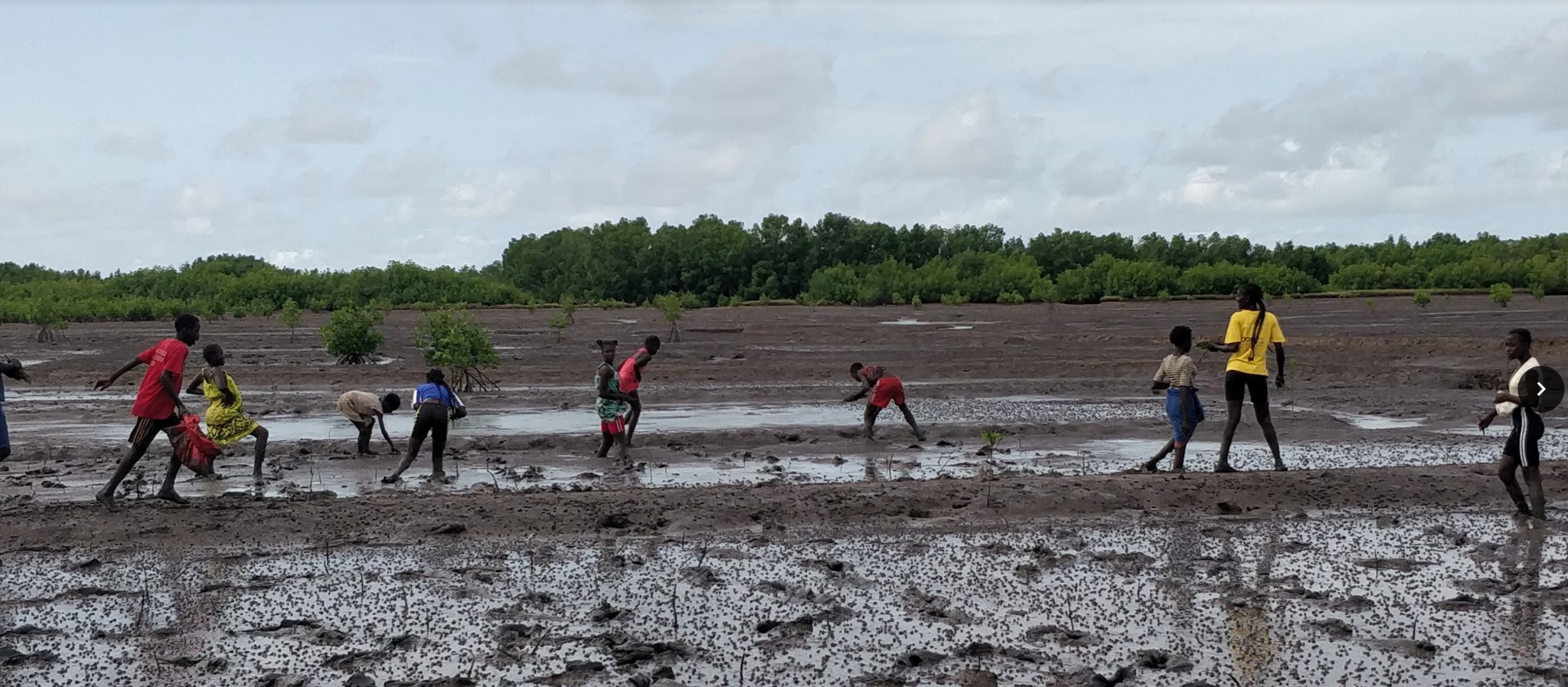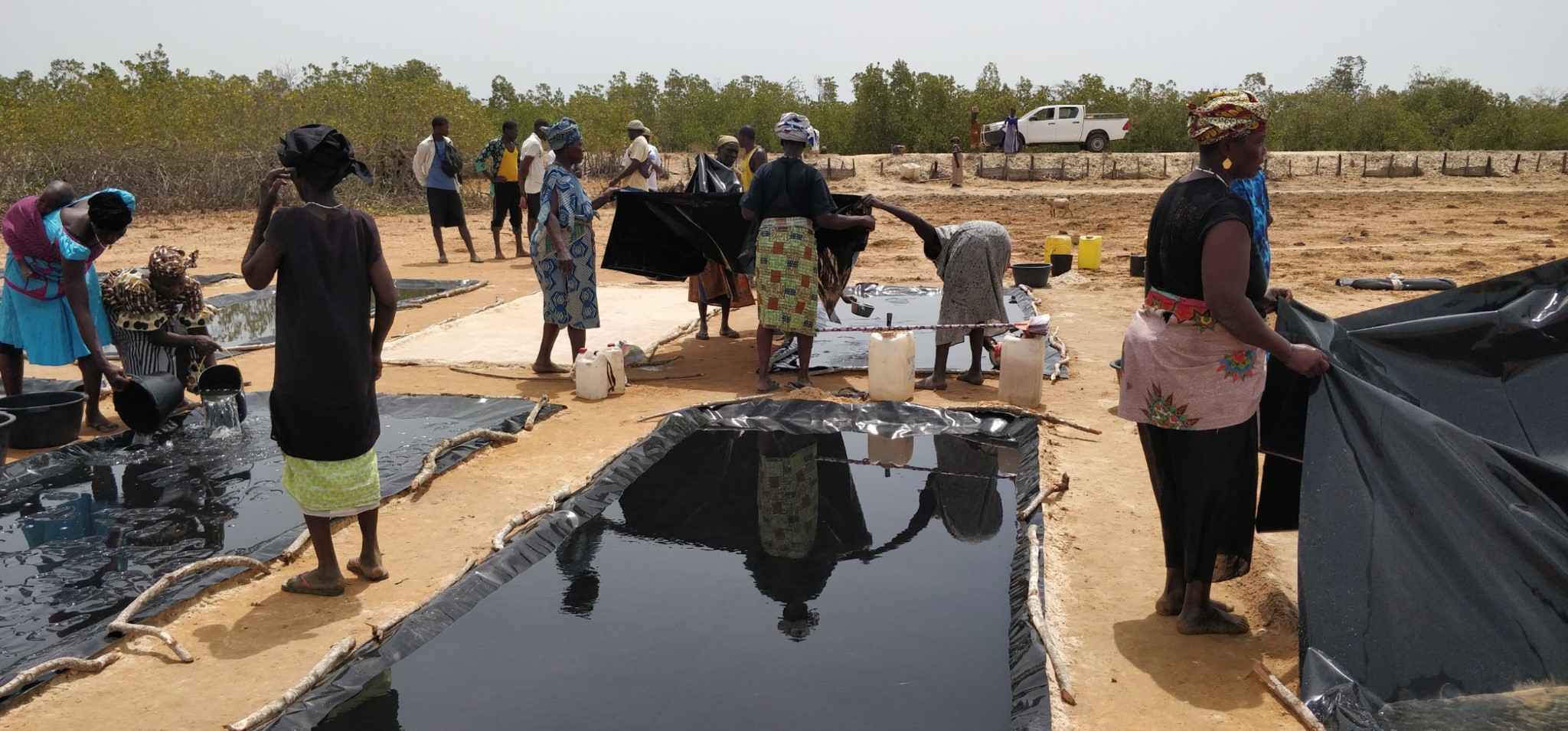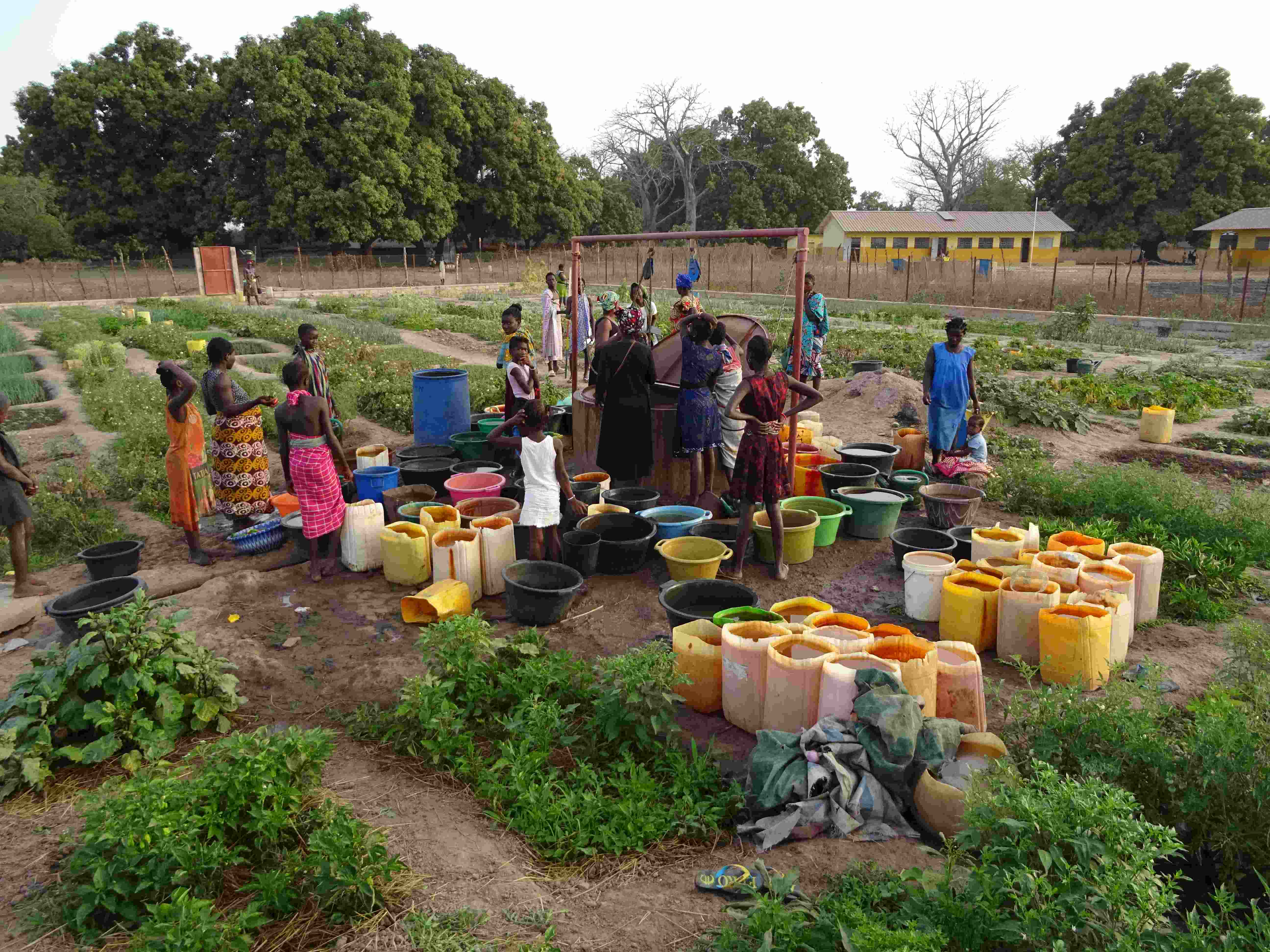Tackling climate change, food security, and community development in Guinea-Bissau
Addressing the intertwined issues of climate change, ensuring food security, and fostering community development in Guinea-Bissau.
The TRI project in Guinea-Bissau has prioritized building integrated solutions that address combined challenges of climate change, food security and community development.
Mangrove forests straddle land and sea, protecting communities from storm surges, providing nurseries for wildlife and natural resources, and creating important boundaries for areas. Most of the villages included in the TRI Guinea-Bissau project (known as “Arroz e Mangal” or “Rice and Mangroves”) are in the middle of such mangrove forests. As such, communities typically travel by rowboat and obtain many of their resources from the mangroves. However, in recent years, due to sea level rise and the compounding impacts of climate change, and even with mangrove presence, seawater has impacted communities by entering homes. To protect their livelihoods – especially rice fields – men are building ever higher dikes. Such dikes create short-term solutions, though, as the tubes (made from palm trunks) that drain the rice fields are no longer large enough when water levels become overwhelmingly high and rains become occasionally violent. Further, the palm trunk tubes are not watertight enough when the rain falls and the water has to be kept in the rice fields. These farmers are on the front lines in a battle against climate change.
 In rice fields abandoned because of climate change, young people are working to restore mangroves by transplanting rhyzophora propagules.
Photo: Pierre Campredon, IBAP
In rice fields abandoned because of climate change, young people are working to restore mangroves by transplanting rhyzophora propagules.
Photo: Pierre Campredon, IBAP
There is more to the picture though. Younger community members have opted to leave their villages in the hopes of finding employment or leisure opportunities in urban areas. However, when the work of elders and remaining community members is no longer sufficient, the inevitable consequence is the abandonment of rice fields.
Women are incredibly important in the communities; they not only take care of domestic labour and household management but are also active in resource management: transplanting seedlings in the rice fields where they travel to via dugout, harvesting or threshing grain, fetching fresh water (which can be a 5 to 6 hour dugout-row away), collecting dead wood in the mangrove forests, and tending gardens of food crops.
In such turbulent conditions, how can the restoration of the mangroves be presented to local community members as a priority? In what terms should the necessary balance be struck between long-term resilience objectives and the immediate needs of inhabitants? Considering these important pieces, the TRI project in Guinea-Bissau, from 2019 onwards, has prioritized building integrated solutions that address these different dimensions.
In this vein, a participatory diagnosis of the local territory was developed, using aerial drone images. After the initial surprise of contemplating their space from a bird’s eye view, the project team and local community members worked together to identify the rice fields of strategic importance for their security, along with those that could be converted back to mangrove ecosystems, thus bringing up the subject of mangrove restoration. A lengthy process of territorial planning and forecasting made it possible to resolve both the rehabilitation of rice fields and the restoration of mangroves. At the same time, the project focused on the specific needs of women, for whom the solutions identified aimed to simultaneously relieve them of work while reducing pressure on resources.
The project proposes a negotiated solution with the communities of the identified sites, to first make a participatory diagnosis of the rice fields that are being cultivated and those that have been abandoned. With these abandoned rice fields, the project proposes assisted natural regeneration, or the planting of mangroves, to be able to effectively create a belt of protection for these fields. – Rui Daniel Barbosa de Andrade, TRI Project Coordinator
Actions prioritized by and for women have resulted in a reduction of pressure on wood through the construction of improved clay stoves for cooking food, as well as the development of solar salt production, which relieves the exhausting task of collecting fuelwood and cooking salt. Oyster aquaculture experimentation and training provided interesting prospects by reducing the pressure on wild oysters. The installation of six rice huskers has also had an impact by saving women the effort of pounding rice, just as the provision of motorized dugout canoes has facilitated their travel for drinking water and access to local markets. Finally, the creation of vegetable gardens has had the effect of improving the quality of food for families while generating additional income.
The project will support the communities with income-generating activities to allow an improvement in their living conditions, but also to alleviate the working conditions, especially of women, who actively participate in rice production. – Rui Daniel Barbosa de Andrade, TRI Project Coordinator
The experience confirms the value of addressing these different components in an integrated manner: the project thus responds to the challenges of climate change, food security and community development. The testimonies collected show that the TRI Guinea-Bissau project is helping to energize and strengthen the resilience of the population in a context of climate change that represents considerable challenges.
[Women grow] eggplant, jagatu, tomato, lettuce and bell pepper ... to sell at the port. We are satisfied with the project, so that I can pay for my children to go to school. – Sugunda Isnaba, Enxudé village
 Solar salt production saves wood and reduces strain on women, as compared to traditional methods.
Photo: Pierre Campredon, IBAP
Solar salt production saves wood and reduces strain on women, as compared to traditional methods.
Photo: Pierre Campredon, IBAP
To build upon this success, in 2022, the National Coordination Platform for Restoration was established. The mission of this platform is to coordinate initiatives related to mangroves and, in particular, to: 1) promote the exchange and sharing between institutions, organizations and people concerned by the situation of mangroves in Guinea-Bissau; 2) promote activities related to its areas of intervention; and 3) formulate recommendations for the sustainable management of the ecosystem and its resources. Members of the platform include ex officio members and invited members. This will continue into 2023 by 1) carrying out a ROAM exercise to identify opportunities for mangrove restoration; 2) creating a database of mangrove restoration actions at national level; 3) formulating a proposal for a mangrove conservation law; and 4) developing a national mangrove restoration strategy.
This story is from TRI Year in Review 2022

